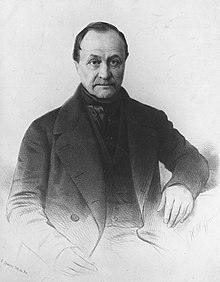Isidore Auguste Marie François Xavier Comte
| Auguste Comte | |
|---|---|

Auguste Comte by Tony Touillon.
|
|
| Born |
Isidore Marie Auguste François Xavier Comte 19 January 1798 Montpellier, France |
| Died | 5 September 1857 (aged 59) Paris, France |
| Nationality | French |
| Alma mater |
University of Montpellier École Polytechnique |
| Spouse(s) | Caroline Massin (m. 1825–1842) |
|
Notable ideas
|
Sociological positivism, law of three stages, encyclopedic law, altruism |
|
Influences
|
|
Isidore Marie Auguste François Xavier Comte (/ˈɪzədɔːr oʊˈɡuːst məˈriː frænˈsweɪ seɪvi.ər kɒəmˈteɪ/; 19 January 1798 – 5 September 1857) was a French philosopher who founded the discipline of praxeology and the doctrine of positivism. He is sometimes regarded as the first philosopher of science in the modern sense of the term.
Influenced by the utopian socialist Henri Saint-Simon, Comte developed the positive philosophy in an attempt to remedy the social malaise of the French Revolution, calling for a new social doctrine based on the sciences. Comte was a major influence on 19th-century thought, influencing the work of social thinkers such as Karl Marx, John Stuart Mill, and George Eliot. His concept of sociologie and social evolutionism set the tone for early social theorists and anthropologists such as Harriet Martineau and Herbert Spencer, evolving into modern academic sociology presented by Émile Durkheim as practical and objective social research.
...
Wikipedia
